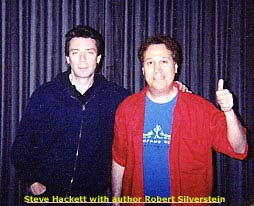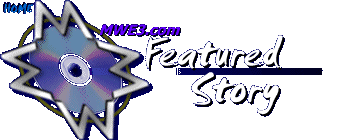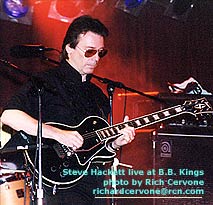 STEVE
HACKETT
STEVE
HACKETT
interview written by Robert Silverstein
June 26, 2002 was one of the most oppressively hot
summer days in New York City history. A dark, shrouded sky and a heavy,
humid feeling of languor permeated the city air that day. Perfect
timing for an interview with England’s legendary progressive
rock guitar hero, Steve Hackett. Embarking on a 2002 North American
tour that included a 6/28 appearance at BB King’s nightclub in
NYC and a headlining appearance on 6/30 at the 2002 NEAR Fest (The
North East Art Rock Festival), Hackett and his band were ready to
give long time fans exactly what they wanted. The early Summer 2002
live shows also provided a convincing way to promote Hackett’s
new four CD box set simply called Live Archive 70,80,90s. Thankfully,
Pittsburgh-based Inside Out Music America—one of the best labels
on the current prog-rock scene—recently picked up Live Archive
along with several titles from the prodigious Hackett back catalog
for 2002 reissue, including the underrated ‘99 album Darktown.
Filled with somber images from his youth, Darktown is Hackett
at his most imaginative and occult. In 2002, more than thirty years
after early ‘70s Genesis classics Nursery Crime and Foxtrot
energized music fans at the dawn of progressive rock, Hackett
remains an acclaimed electric and acoustic guitar hero and a preeminent
singer-songwriter who is equally at home playing Chicago blues, classical
guitar and quintessential 1971-style London prog-rock. Steve’s
current band features a number of gifted players including keyboadist
Roger King. The untimely deaths of both John Entwistle and
Billboard editor Timothy White on June 27, the day after Steve’s
20th Century Guitar interview and a day before his show at BB King’s
on Friday, cast a dark cloud over the music world. Aware of what many
were feeling the night of the 28th, Steve praised Entwistle at the
BB King’s show before leading his band into a somber rendition
of the Darktown highlight “In Memoriam”. At the BB
King’s show I had the honor to sit next to King Crimson co-founder
Ian McDonald. After telling Ian how much I still admire what I consider
perhaps the best album of 1969, In The Court Of The Crimson
King, Ian was quick to point out how skillfully Steve executed
the talking guitar sound that was featured on Darktown, an
album Ian also played sax so well on. Calling Steve Hackett
an inspiration to guitarists and music lovers alike would be an understatement.
For an glimpse into just how diverse and influential a guitarist Steve
Hackett remains check out his ‘90s CD masterpieces Guitar
Noir (1993), Sketches Of Satie (Steve’s 2000 studio
album recorded with his brother, flautist John Hackett), Blues
With A Feeling (1994 - one of the greatest rocking electric blues
albums in recent memory), A Midsummer Night’s Dream (recorded
in ‘97 with the London Royal Philharmonic), the live prog
supergroup sounds on 1998’s The Tokyo Tapes and the haunting,
gothic Darktown (Steve’s ‘99 rock studio album).
In this rare interview with mwe3.com and 20th Century Guitar music
editor Robert Silverstein, Steve Hackett offers his savvy musical
insights and shines a new light on his many years of guitar excellence.
Steve Hackett: SH
Robert Silverstein: RS
RS: It’s been quite a while since you toured the U.S.
SH: It’s true, yeah.
Q I know you’re playing the Near Fest on Sunday. With the reissues
of Darktown, Feedback 86 and the Live Archive box from
your back catalog on Inside Out Music America, there seems to be a
long overdue effort to bring your music back into the public ear and
eye again.
SH: Well Inside Out, we’ve been working with them for a while
in Europe and they’ve done a very good job for us. Really the
NEAR Fest thing came by Billy so I don’t know what his contact
was as regards to that or why that one came our way. Why it came through
Inside Out...I suspect it must be. All I know is it sold out in 45
minutes which was a record for any one of my gigs. Then again, it’s
part of the festival, there are other people on the bills. I guess
it’s the whole genre of music and I realize alot of people have
been saying progressive music is not a financially viable proposition
and that’s been proved wrong. People are always trying to write
off other people and their ideas and genres. There’s alot of
premature burials that go on in the business. It’s because the
business is a very nervous one and everyone wants to feel that they’re
in possession of the holy grail—whatever it happens to be this
week. It’s a shame that music is sold very much by it’s
label these days. I mean, at one time that really wasn’t the
case. But there’s this tremendous need to want to lump things
into one area these days and so it means whatever you do it is immediately
classified. It actually means that there’s no room for growth
outside that because once you’ve been typecast...you’re
doing westerns for life (laughter).
RS: How far back is IOMA going to go with your catalog?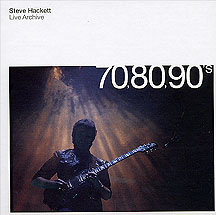
SH: I suspect what we’ll want to do is y’know, see how these
three albums go first of all...Darktown, Feedback 86 and the
Live Archive album. I suspect there might be a whole bunch
of stuff that we might be able to put their way if it came to it.
RS: The NEAR Fest line-up looks interesting. I heard Caravan playing
too.
SH: I was doing some shows in South America last year and it seems
as if Caravan had done some of those same countries. I’m doing
more gigs at the moment. Not just gigs with a rock band, a five piece
rock band. I also have my trio. I have an acoustic trio and we just
did Japan, Hungary and Italy. So we tend to do a week in each territory
if we possibly can. And I’m going back to Italy after this and
that’ll be acoustic stuff again, you know acoustic guitar work.
So it’s not all electric guitar for me. Some of what I do really
wouldn’t fit into the progressive genre at all.
RS: It’s interesting to note that so many of today’s younger
prog-rock bands cite your solo albums and your early work with Genesis
as such a big influence. One of your fans in England told me you recently
joined the Genesis tribute band, The Musical Box on stage.
SH: I did, that’s right. A week or two ago I played with them.
They were doing the Royal Albert Hall in London and I joined them
for an encore. That was fun.
RS: Are you surprised how much of an influence your ‘70s work
in Genesis still is on young bands today.
SH: I don’t think any artist has got any idea of how wide reaching
his influence can be. Most of the time we’re too busy dealing
with the day to day of trying to either improve or rebuild credibility
up in an industry that’s predisposed towards wiping the slate
clean and wanting fresh blood all the time. So you go through this
process of constantly having to remind people, just by showing up
of what you do and what you did. So people ask me a lot of Genesis
questions. Fortunately, it’s been balanced with new stuff as
well. There’ll be the occasional GTR question. But to get back
to the main thrust of what you’re after here. I’m very flattered
if people say that they enjoy what I do, whether it’s what I
did, or whether it’s what I do. Whatever tense they use with
it. It is very flattering. All I can say is that I’ve had my
heroes and I still do have my heroes. The thing is, I think that music
to be truly magical has always got to come from someone else. No matter
how good you are yourself, you know where it’s come from. You
know, it’s come from you and you champion it, do what you can
with it to bring it to the forefront of people but I think that the
stuff that’s truly magical is always stuff that other people
have done and very often it’s the early music that you take on
board yourself. The soundtrack of your own youth. And so when I was
growing up in the ‘50 and the ‘60s much of what I heard
seemed impossibly beautiful...the language of heaven from the distant
gods. And so, the angels came down and graced me with loads of stuff
from way back then. And I was so taken with other people’s magic.
I just got on with the craft of trying to play guitar or harmonica
and trying to write a song. And I’m still involved with that
same process. It’s still the same process even now. And I think
that people always think that because you’ve been involved in
it for a long time that you’ve cracked it and that you’ve
made it and that you’ve done it. Whereas the performer is always
trying to come up with music that hits people in the same way that
the stuff he heard when he was young did for himself.
RS: Dave Davies told me that Duane Eddy was a big influence on his
early guitar playing. Were you influenced by the early instrumental
guitar sounds of Duane Eddy and The Ventures and The Shadows?
RS: Absolutely! It’s easy to bypass all of that and move on to
an era that became slightly more virtuosic. But there was still an
excitement about that era and I still love “Because They’re
Young”, you know Duane Eddy’s version of “Because They’re
Young” was one of the first records that drove me bananas. Actually
it was when the strings took the melody it really got me. I was very,
very young...it was like preteens when I heard that.
RS: This was before The Shadows?
SH: It was well about the same time. There was The Shadows...there
was actually even The John Barry Seven who did a version of “Walk,
Don’t Run”, which I think had been a Ventures tune. So I
never actually heard The Ventures’ original of that. You know,
it was such heady stuff! Most guitar records in those days sounded
a little bit like the Bonanza theme. They could all have been
themes from westerns really. And many western soundtracks were adapted
to be played on guitar. And that was really the nature of it. And
so much of that stuff sounded like they were just written on bass
strings. Two strings. You could play “Wipe Out”, play “Pipeline”
by The Chantays I think it was. I could play these things on two strings
and people used to say to me, ‘you can play guitar!’. I
said, ‘what I can do is, between the second and third fret, and
an open E and and and open A I can get’...(sings riff to “Pipeline”)
And that’s “Pipeline” isn’t it? So, and “Wipeout”
(sings “Wipeout”). And I still love “Wipeout”.
I love the laughs at the beginning of course. (laughter)
RS: Did you start becoming interested in classical guitar music before
or after that?
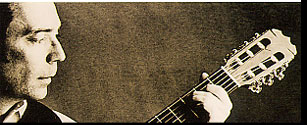
SH: Oh after that. Yeah, it was a good deal after. I was listening
to The Stones and The Beatles and listening to early R&B. And
then I heard an album of Segovia playing Bach and it was a revolution
in my little world of music then to hear this fantastic music being
played in one go, on one guitar...the independence, the fluency, bass
lines, and top lines and chords and the fact that it sounded absolutely
limitless was a revelation to me.
RS:
This was during The Beatles and The Stones?
SH: This was 1965 specifically.
RS: So Segovia was your introduction to classical...
SH: Segovia was my introduction to...not to classical music as such.
Because I’d fallen in love with Tchaikovsky already as a kid,
and Ravel. As a kid, I loved “Bolero”. And throughout the
‘50s, before I was even aware of rock and roll, listening to
Mario Lanza in the very early ‘50s, when I was still very tiny,
but I was aware of music.
RS: The Beatles were a big factor in blueprinting the late ‘60s
early ‘70s progressive rock movement that followed with The Moody
Blues and later King Crimson, Yes and Genesis?
SH: I think The Beatles have got, yeah, definitely a part to play
there because The Beatles were working with orchestras, they were
experimenting with long form. Sgt. Pepper ran practically consecutively.
Certainly the second side of Abbey Road, which all ran continuously,
was something that has to be a defining moment in the birth of progressive.
Except that nobody called The Beatles progressive but perhaps, progressive
music will claim them as one of theirs. It’s just that The Beatles
went through eras of the R&B influence. Basically there’s
Chuck Berry and then there’s all the stuff they wrote on their
own it seems to me. But also there’s another band that people
mention very much these days who also worked wonderfully with orchestras
and that was Procol Harum. I think they were a big influence on early
Genesis as well.
RS: Do you recall the first time you heard the Mellotron?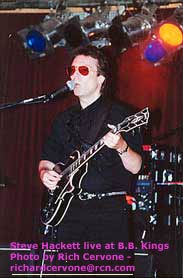
SH: Well the first time I was really aware of the Mellotron was seeing
King Crimson live using it playing at the Marquee and I’ve had
many conversations with Ian McDonald since about his use of the Mellotron
which was truly wonderful. I was knocked out with what it could do
for a band I have to say. It transformed a rock band into an orchestra
really.
RS:
Wasn’t it your idea to bring the mellotron into Genesis to make
them more dramatic?
SH: Yes it was, yes absolutely. I thought that Genesis was a band
that needed to expand in many ways. It had to be able to deliver,
live, something very, very complex. It had to present something visually
which would make the rather long, complex songs more easily digestible
by basing them around the presentation so that the music became an
extension of the presentation rather than the other way round. So
I was very well aware that we needed to be able to control our environment
live.
RS: That period with Nursery Crime was noted for some brilliant
use of the mellotron.
SH: We used it alot, yeah.
RS: And also with Fragile and the first King Crimson album...
SH: Yes, exactly and I think all of those bands fell in love with
the sound of it, there’s no doubt. And then after a while you
pull back from it, but it is a sound that mixes very well with other
things. I’ve sometimes twinned an electric guitar solo and had
a little bit of mellotron playing the same notes as well. It can still
be a very beautiful sound. Alot of bands used it well as well, like
Focus, for instance.
RS: Fast forwarding, The Tokyo Tapes CD and DVD you released
a couple years back is an outstanding tribute to the spirit of progressive
rock you helped pioneer in the early ‘70s. How did you come to
join together with Ian McDonald and John Wetton for The Tokyo Tapes?
SH: I did some rerecorded Genesis material on a studio album called
Genesis Revisited. Both Ian and John Wetton played and sang
on that and I wanted to do it live and Japan gave me the opportunity
to do that. I never played Japan. They were very interested in that
cast of characters coming and we tried in the time available to feature
tunes from the background of the various members. Had I had longer
in rehearsal, I would have even included some maybe some Zappa stuff
and some Weather Report stuff that featured Chester (drummer Chester
Thompson). It wasn’t quite as democratic as I would have liked
it to have been, but I think everyone got a fair crack at playing
on that album, so we did some John Wetton tunes, we did some King
Crimson tunes that Ian had done, “Court Of The Crimson King”
and “I Talk To The Wind”. And in a way it was a kind of
homage to something which became perceived as the genre, which was
eventually called progressive rock. But when we were working on that,
and I’m sure when King Crimson were working on their first album
with Ian, I’m sure they were not calling themselves progressive.
What was happening was that people were influenced by many different
styles of music, as they were with Genesis. And jazz had it’s
part to play as did classical music as well as rock and pop and a
whole host of other things that eventually permeated through.
